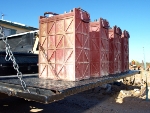
Ignoring SLAB Exports Won’t Protect Jobs or Help the Environment
With the publication of Occupational Knowledge International’s report, “Exporting Hazards” in June 2011, readers were provided the first full account of how many spent lead acid batteries (SLABs) are shipped to Mexico each year for recycling in substandard facilities. We also learned Mexican battery recyclers have emissions of lead and other toxics that are 20 times higher than comparable U.S. facilities. While the article reported that more than 520 million pounds of batteries were shipped to Mexico in 2010, indications are that number will be even greater in 2011.
Whether the goal is protecting the environment or saving U.S. jobs, stopping SLAB exportation must be a priority. To achieve this, governments, companie, and others who maintain or service large fleets must focus on this neglected issue and take steps to ensure they are not part of the problem. The unfortunate reality is that too many of these entities are unaware of or ignore the issue.
Currently the U.S. Environmental Protection Agency and the General Services Administration are considering banning the exports of all e-waste generated by federal government agencies. Yet, each year the vehicle fleets of the federal government create millions of pounds of SLABs that are disposed of through contracts with battery brokers, haulers, and other parties who collect the batteries and sell them to companies that recycle in Mexico.
Not only are SLABs generated by the more than 662,000 cars and trucks the government owns or leases, but also by the boats, planes, helicopters and emergency backup systems that also use lead acid batteries. Despite the report stating, “more than twice as much lead is exported to Mexico in used batteries than is exported in all electronic waste (e-waste) exported from the U.S.”(p.1), there is no effort to ban the exportation of government created SLABs.
With more than 20 pounds of lead, a gallon of sulfuric acid and 3 pounds of plastic in each SLAB, improper recycling of these batteries can cause significant harm to workers, the environment and surrounding communities. Any regulation to ban government generated e-waste exports that does not include SLABs will be a failure. We must stop thinking that somehow SLABs are different than e-waste. The issues are the same. Not only must SLABs and e-waste be connected in regulations governing disposal of federal government e-waste, but every state and local government must also ensure batteries purchased with taxpayer dollars are recycled domestically.
The fact that 12 percent of all American-generated SLABs are destined for Mexico’s substandard recycling facilities also indicates companies that maintain large domestic fleets or service them are unaware of where their batteries are being recycled. For example, over the past 11 years, AAA has been hosting The Great Battery Roundup to collect used car batteries. In addition, AAA collects and recycles more than 1.1 million batteries each year. When our organization asked them where the batteries were recycled, AAA informed SLAB Watchdog, “Currently, of the battery cores collected by the AAA Battery Service and returned to East Penn Manufacturing, substantially all are recycled in the United States”.
Either AAA never knew or never asked, but East Penn Manufacturing exports more than 88 million pounds of SLABs to Mexico each year and is the second largest domestic SLAB exporter. When we asked AAA to state clearly and unequivocally that none of the spent lead acid batteries or their components collected by AAA are recycled outside of the United States or Canada we received no such statement.
While AAA is not alone, we have highlighted them to show that companies which maintain or service large fleets have a responsibility to make sure the SLABs they handle are reclaimed in state-of-the-art domestic facilities. In addition, the SLABs generated by federal, state and local governments from batteries purchased with taxpayers dollars, must be recycled domestically to protect American jobs. If these two groups stop ignoring the issues of SLABs, we expect SLAB exportation will cease to exist very quickly, American workers will see greater employment opportunities, and any threat of environmental damage will be mitigated.
Diane L. Cullo is the director of SLAB Watchdog.
Posted on Nov 07, 2011